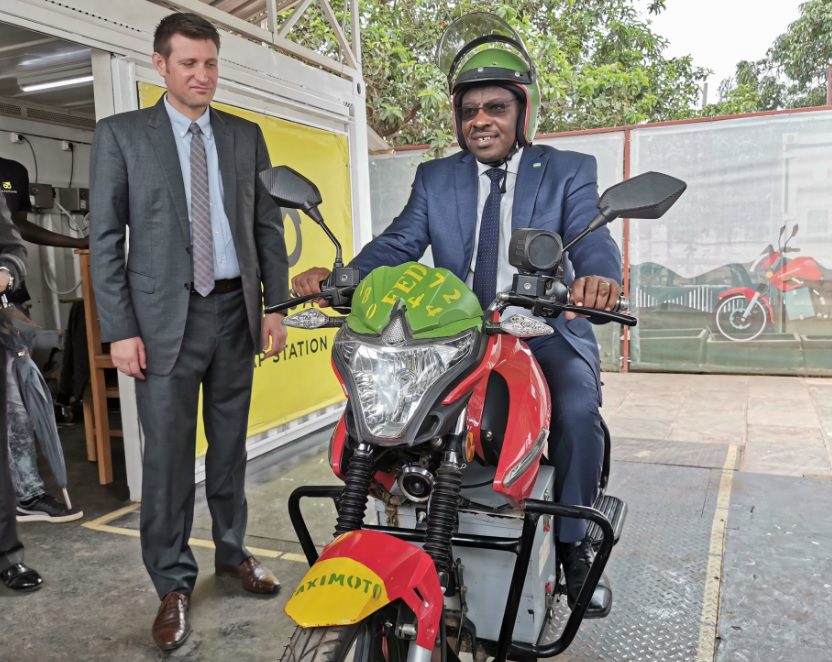With rechargeable batteries located under their tanks and a few charging stations dotted around Kigali, a new generation of electric motorcycles are quietly plying the city and its outskirts, releasing next to zero carbon emissions or noise pollution.
The move is part of the government initiative to promote e-transport as a so-called green mobility option which is also a viable solution to reducing air pollution in the Rwandan capital as well as in other urban centres.
Since May this year, residents of Kigali have often encountered such new electric motorcycles with charging stations which are currently being tested in the city and its outskirts.
It only takes 45 minutes to fully charge the motorbike where this powers a 90 kilometer ride.
“Being the first batch of pure electric motorbikes in operation in Rwanda, the new machines were introduced as a move to complement the growing trend of e-mobility in the country” Claver Gatete, Rwanda’s Infrastructure minister told the African Press Agency.
This new technology is still under the trial phase, with only twenty e-motorbikes operating on a commercial basis, taking passengers and goods across Kigali.
Their riders rent batteries from a network of established charging stations around town that they can fix in less than two minutes.
The batteries can allow them to ride 70-80 kilometers and they can recharge the battery three times a day, according to Josh Whale, Chief Executive Officer of Ampersand an electric vehicle company which is currently operating in the distribution and maintenance of new electrical motorbikes in Rwanda.
“We are currently looking to revolutionize the way Africans power transport by making mass-market electric vehicles cheaper and better than petrol” he said.
Environmental experts believe that e-motors are calculated to generate a 75 percent net reduction in greenhouse gas emissions compared to petrol bikes.
Per year fuel savings are projected north of $900 per bike, more than doubling the income of the average driver, they claimed.
As part of the new business partnership to promote e-mobility in Rwanda, the United Kingdom’s Department for International Development (DfID) is currently backing Ampersand through its Frontier Technology Live streaming Programme, which is designed to help the organisation apply frontier technologies to development challenges.
“With its rugged and affordable e-Motor, Ampersand can out-compete the incumbent petrol vehicles today and make a real impact on transportation and petrol consumption” said Hanane Hafraoui, the Climate and Energy Economic Advisor at DfID.
Green private and shared public transportation can ensure clean air and better health for citizens, lower greenhouse gas emissions, less road congestion and importantly cut Rwanda’s dependence on imported crude oil.
The country imports between 400,000 and 600,000 cubic meters of fuel every year, according to official estimates by the Ministry of Trade and Industry.
However, the first of major hurdles is the inadequate battery charging infrastructure, but the Rwandan government is mooting plans to set up more electric-charging facilities across Kigali in the near future.
In the meantime, electric two-wheels have begun plying Kigali roads, targeting micro-mobility or short distance journeys that are 3 to 5 kilometres long.
But for motorbike drivers who are accustomed to long distances on a full-tank, the fear of being stranded halfway remains stressful.
Another big question being asked by them is whether Rwanda’s national grid is ready to power the batteries for electric motorbikes to finally take to the road beyond the trial period.
Ferdinand Bizumuremyi, a motorbike taxi driver who purchased a new electric motorbicyles complained to APA that its recharging system still has inherent cost and complexity issues because it takes time as opposed to other technologies.
“This innovation is great but its innovators should know that users of these electric motorbikes still experience challenges reaching the few established charging facilities around town” he said.
CU/as/APA


